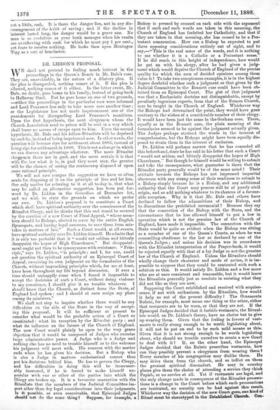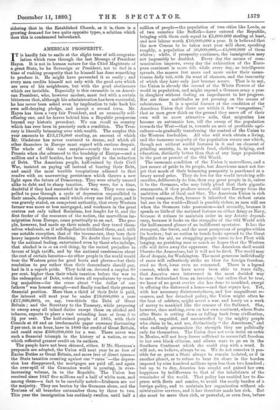DR. LIDDON'S PROPOSAL.
WE hail not pretend to feeling much interest in the proceedings in the Queen's Bench in Mr. Dale's case. They are, unavoidably, in the nature of a dilatory plea. If the plea is disregarded, nothing comes of it. If the plea is allowed, nothing comes of it either. In the latter event, Mr. Dale, no doubt, goes home to his family, instead of going back to Holloway Gaol. But he goes home on one of two grounds, —either the proceedings in the particular case were informal and Lord Penzance has only to take more care another time ; or the Legislature has not made imprisonment one of the punishments for disregarding Lord Penzance's monitions. Upon the first hypothesis, the next clergyman whom the Church Association send to prison will be sent in a way which shall leave no means of escape open to him. Upon the second hypothesis, Mr. Dale and his fellow-Ritualists will be deprived by-and-by, instead of being imprisoned now. In other words, the question will become ripe for settlement about 1883, instead of being ripe for settlement in 1880. This is not a change in which we can discern any advantage whatever. The more Ritualist clergymen there are in gaol, and the more certain it is that with the law what it is, in gaol they must stay, the greater will be the chance of seeing the controversy disposed of upon some rational principle.
We will not now reargue the suggestion we have so often made for disposing of it on the principle of live and let live. Our only motive for referring to it at all to-day is, that what may be called an alternative suggestion has been put for- ward by Dr. Liddon in the Guardian of December 1st, and we wish to state the grounds on which we prefer our own. Dr. Liddon's proposal is to constitute a Court which shall have spiritual authority over the consciences of the Ritualist Clergy, and lie thinks that this end would be secured by the creation of a new Court of Final Appeal, "whose mem- bers should be Bishops, elected to serve by the entire English Episcopate, and having legal assessors, to save them from mis- takes in matters of law." Such a Court would, at all events, have spiritual authority over Dr. Liddon himself. He admits that it is only too probable that it "would not seldom and bitterly disappoint the hopes of High Churchmen." But disappoint- ment ought not then to be synonymous with resistance. "Prin- ciple," says Dr. Liddon, "is principle ; and I, for one, could not question the spiritual authority of an Episcopal Court of Appeal, exercising its own judgment on the formularies of the Church, without impeaching principles which, for me at least, have been throughout my life beyond discussion. If ever a time should unhappily come when I found it impossible to accept the decisions of such a Court, without doing violence to my conscience, I should give it no trouble whatever. I should know that the Church, as distinct from the State, of England bad spoken ; and I should at once resign my place among its ministers."
We shall not stop to inquire whether there would be any difficulties on the side of the State in the way of accept- ing this proposal. It will be sufficient at present to consider what would be the probable action of a Court so constituted ; what its reception by the Ritualist party ; and what its influence on the future of the Church of England. The new Court would plainly be open to the very grave objection that it would be composed of Judges who exercise large administrative power. A Judge who is a Judge and nothing else has no need to trouble himself as to the welcome his judgment will meet with. His concern with the matter ends when he has given his decision. But a Bishop who is also a Judge in matters ecclesiastical cannot thus put his decisions behind him. He has to govern the Clergy, and his difficulties in doing this will be immeasur- ably increased, if he is forced to make himself un- popular with one or other of the parties into which the Clergy are broken up. It is a favourite contention with the Ritualists that the members of the Judicial Committee im- port other than dry legal considerations into their judgments. Is it possible, or even conceivable, that Episcopal Judges should not do the same thing? Suppose, for example, a
Bishop is pressed by counsel on each side with the argument that if such and such words are taken in this meaning, the Church of England has forfeited her Catholicity, and that if they are taken in that meaning, she has ceased to be a Pro- testant communion. How can a Bishop be expected to put these opposing considerations entirely out of sight, and to say,—" This is the real sense of the words, and it is nothing to me whether it is a Catholic or a Protestant sense." If he did reach to this height of independence, how would he get on with his clergy, after he had given a judg- ment which would deprive the Church of England of the precise quality for which the men of decided opinions among them value it? To take two conspicuous examples, it is in the highest degree doubtful whether such a judgment as that given by the Judicial Committee in the Bennett case could have been ob- tained from an Episcopal Court. The gist of that judgment was that a Eucharistic doctrine not distinguishable, except by peculiarly ingenious experts, from that of the Roman Church, may be taught in the Church of England. Whichever way the Bishops had determined the point, they would have gone contrary to the wishes of a considerable number of their clergy. It would have been just the same in the Gorham case. There, equally as in the Bennett case, the plain meaning of the formularies seemed to be against the judgment actually given. The Judges perhaps strained the words in the interest of comprehension, but the Bishops might have been equally dis- posed to strain them in the interest of exclusion.
Dr. Liddon will perhaps answer that he has conceded all this beforehand, since he has said in his letter that such a Court "would not seldom and bitterly disappoint the hopes of High Churchmen." But though he himself would be willing to submit and take the consequences, what guarantee is there that the Ritualist party generally would be of the same mind ? Their attitude towards the Bishops has not impressed impartial observers with any strong sense of their readiness to submit to a Bishop simply because he is a Bishop, and any additional authority that the Court may possess will be of purely civil origin, and so add nothing whatever to its chances of a favour- able reception. Why is it that Mr. Dale and others have declined to follow the admonitions of their Bishop, and to discontinue the prohibited ceremonial? Because they say that the connection of the Bishop with the State, and the circumstance that he has allowed himself to put a law in operation which is not the genuine law of the Church of England, have made it impossible. The connection with the State would be quite as evident when the Bishop was sitting as a member of one of the Queen's Courts, as when he was counselling obedience to the law as declared by one of the Queen's Judges ; and unless his decision was in accordance with the Ritualist interpretation of the Prayer-book, it would be rejected equally with that of a lay Judge as not the genuine law of the Church of England. Unless the Ritualists should wholly change their character and mode of action, it is im- possible to suppose that they would be contented with such a solution as this. It would satisfy Dr. Liddon and a few more who are at once consistent and reasonable, but it would leave the Ritualists generally just as resolute in resisting what they did not like as they are now.
Supposing the Court established and received with acquies- cence, if not with enthusiasm, by the Ritualists, how would it help us out of the present difficulty ? The Ornaments Rubric, for example, must mean one thing or the other, either that vestments are to be worn, or that they are not. If the Episcopal Judges decided that it forbids vestments, the Ritual- ists would, on Dr. Liddon's theory, have no choice but to give up wearing them. Given that the feeling in favour of vest- ments is really strong enough to be worth legislating about, it will not be put an end to by such mild means as this. Given that it is not strong enough to be worth legislating about, why should we trouble ourselves to create a new Court to deal with it ? If, on the other hand, the Episcopal Judges decided that the Rubric prescribes vestments, how can they possibly prevent a clergyman from wearing them Every member of his congregation may dislike them. He may drive them from the church, and so inflict on them the greatest spiritual discomfort. He may in country places give them the choice of attending a service they think Popish, or no service at all. Yet if vestments are legal, and the only change made in consequence of the Ritualist prosecu- tions is a change in the Court before which such prosecutions are instituted, no security can be had against this result. Whichever way the decision of the new Court goes, one kind of Ritual must be stereotyped in the Established Church. Con- sidering that in the Established Church, as it is, there is a growing demand for two quite opposite types, a solution which does this is condemned beforehand.







































 Previous page
Previous page